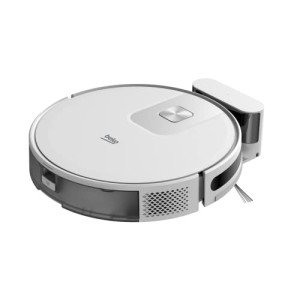5 Laws That Can Benefit The Autonomous Vacuum Industry

The Rise of Autonomous Vacuums: Revolutionizing Home Cleaning
In the age of innovation, family tasks are ending up being increasingly automated, and one of the most significant developments in this realm is the autonomous vacuum. These smart cleaning robots are designed to reduce the drudgery of standard vacuuming, making them popular amongst time-strapped homes. This article checks out the development, performance, benefits, and restrictions of autonomous vacuums, in addition to a comparison of a few of the leading models on the marketplace today.
What is an Autonomous Vacuum?
An autonomous vacuum, likewise referred to as a robotic vacuum cleaner, is a little, automatic gadget that browses through your home to tidy floorings without human intervention. Geared up with sensing units, video cameras, and advanced software, these vacuums can identify barriers, prevent stairs, and enhance cleaning courses. robot vac and mop operate from a rechargeable battery, returning to their charging stations when their power is low or when cleaning jobs are finished.
Key Features of Autonomous Vacuums
Smart Navigation:
- Utilizes sensing units and algorithms to map the environment.
- Can navigate intricate designs and avoid challenges.
Scheduling:
- Allows users to set cleaning times.
- Can operate when your home is empty, making sure minimal disruption.
Connectivity:
- Many models link to Wi-Fi, enabling app control and combination with clever home systems.
- Users can tailor settings, check cleaning status, and get notifications through mobile applications.
Suction Power:
- Varies in between models; some deal adjustable suction settings for different floor types.
- High-end models include effective suction efficient in getting family pet hair and deep dirt.
Floor Type Adaptability:
- Capable of cleaning carpets, hardwood, tiles, and more.
- Particular designs concentrate on customized cleaning for several surface areas.
The Advantages of Using Autonomous Vacuums
1. Time-Saving
Among the most considerable benefits of autonomous vacuums is the quantity of time they conserve. Rather than spending hours pressing a conventional vacuum, property owners can set robotic vacuums to clean while they are taken part in other activities.
2. Constant Cleaning Schedule
With the capability to set up cleansings, these vacuums make sure that spaces are regularly cleaned up, leading to a cleaner home in general. Routine cleaning helps maintain indoor air quality, particularly for families with allergic reactions or asthma.
3. Smart Home Integration
Many autonomous vacuums can be integrated with wise home systems for seamless operation. Property owners can manage their vacuums through voice commands through gadgets like Amazon Alexa or Google Assistant, boosting user convenience.
4. Compact Design
The slim profile of these devices permits them to clean up under furniture, such as sofas and beds, where conventional vacuums frequently can not reach.
5. Pet-Friendly
For pet owners, autonomous vacuums can be a game-changer, as they are typically equipped with specialized functions for getting animal hair and dander, adding to a cleaner home environment.
Limitations of Autonomous Vacuums
In spite of their lots of benefits, autonomous vacuums also have limitations:
1. Minimal Deep Cleaning
While these vacuums effectively maintain cleanliness, they might not change the effectiveness of a deep tidy provided by standard vacuums, especially for greatly stained areas.
2. Capability Constraints
The majority of autonomous vacuums featured little dust bins that need to be cleared frequently, especially in bigger homes or homes with pets. This can be a hassle for some users.
3. Navigation Challenges
Although navigation innovation is constantly enhancing, some models might have a hard time with specific layouts, especially complex areas with numerous barriers or extremely little spaces.
4. Cost Point
While rates have actually become more available, high-end models can still be rather expensive, posing a barrier for some consumers.
Comparison of Top Autonomous Vacuum Models
| Model | Smart Features | Battery Life | Suction Strength | Rate Range |
|---|---|---|---|---|
| iRobot Roomba 980 | App Control, Voice Assistant | 120 minutes | 1700 Pa | ₤ 700 - ₤ 900 |
| Roborock S6 MaxV | Advanced Mapping, Connectable | 180 minutes | 2500 Pa | ₤ 600 - ₤ 800 |
| Ecovacs Deebot Ozmo | Mopping, Smart Home | 110 minutes | 1500 Pa | ₤ 450 - ₤ 700 |
| Neato Botvac D7 | Laser Navigation, Custom Zones | 120 minutes | 2000 Pa | ₤ 800 - ₤ 900 |
| Shark IQ Robot | Self-Emptying Base, Smart Map | 90 minutes | 1500 Pa | ₤ 400 - ₤ 600 |
Significant Takeaways
- Smart Features: Consumers ought to focus on designs providing robust smart features for convenience and performance.
- Battery Life: A longer battery life is beneficial for bigger home.
- Suction Strength: Depending on family needs, differing suction power can considerably affect cleaning effectiveness.
FAQs about Autonomous Vacuums
Q1: How do I preserve my autonomous vacuum?
A: Regular maintenance consists of cleaning the brushes, clearing the dustbin, and examining for blockages. In addition, keeping the sensing units clean will help keep navigation accuracy.
Q2: Can robotic vacuums clean rugs and carpets?
A: Yes, numerous robotic vacuums are designed to efficiently clean both tough surface areas and carpets. Nevertheless, suction power might vary based upon the design.
Q3: Do robotic vacuums require Wi-Fi?
A: While many autonomous vacuums gain from Wi-Fi connection for app control and updates, some designs can run independently without a wireless connection.
Q4: How typically should I run my robotic vacuum?
A: It depends upon your living scenario, however running it several times a week is frequently suggested, particularly for homes with family pets.
In conclusion, autonomous vacuums represent a considerable advancement in home cleaning technology, promising benefit and effectiveness. While these gizmos might not completely change conventional vacuum, they are undoubtedly handy in preserving a clean living environment. As innovation continues to evolve, the future of home cleaning looks promising, and these devices are at the leading edge of the transformation.

